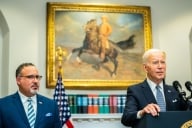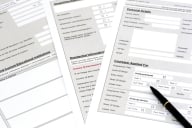You have /5 articles left.
Sign up for a free account or log in.
Last Friday, I attended a meeting of progressive faculty and also started reading Jennifer Egan’s A Visit from the Goon Squad. In raving about the book to friends, I keep calling it Waiting for the Goon Squad by accident, apparently mixing it up with Waiting for Godot and with my identity as a progressive faculty member always waiting for the goon squad to show up -- the goon squad being that vague and shadowy watching cloud that we fear may out us as real people.
The meeting itself wandered into a conversation about our online identities. Someone mentioned the recent case of the provost candidate at Kennesaw State University who was driven away from the job he had accepted by the local paper in Marietta, Georgia — about four hours’ drive northwest from where we were meeting in Statesboro, Georgia. The candidate didn’t out himself as a Marxist on Facebook; he merely cited a source, and the criticism of blacklisting someone based on a cited scholarly source has been well covered elsewhere. But this surveillance of our scholarship quickly and inevitably descended, in our case, into faculty fears that if we let anything slip about ourselves in a public forum in Georgia or elsewhere, someone might see us for who we really are.
In other faculty meetings and professional gatherings, I’ve heard a sort of competitive edge to the fear-driven conversations about what we post and whom we friend online. We have rules: no students; only students who have graduated; maintain two profiles; keep it utterly neutral. Since I began my career in higher education, I’ve learned that faculty members who survive — like other employees in the corporate world and its wannabe stepchildren — are those who embody a poker-faced restraint. This is why I assumed I wouldn’t last long. My poker face is more of a bingo face. And it’s assumed among faculty in general that anything can and will be used against us in a future Horowitz-driven witch hunt or a future round of budget cuts that accidentally happens to target outspoken faculty members.
This larger theme of fear of the cloud ties in nicely with Egan’s book. The "goon squad" in her book could be time itself, or it could be taken to be the cloud of consumer data and its market-driven aims of manipulation. One of the inadvertent heroes of the book — who ends up a superstar by giving in to the cloud — kept himself pure by remaining completely offline. Egan’s super-smart book may be saying that this idle hope is not the way to safety, or she may be saying something else. Her version of electronic communication is sales- and surveillance-oriented, and she’s got fantastic points.
But my version of the cloud also includes the strange and meandering civic functions the cloud provides. People do still occasionally hook up with political causes and learn about social issues through the Internet. And there are people like me — untenured and naked — who occasionally nevertheless post something about their political thoughts or personal experiences online.
In my own case, I have to admit this is driven by the contrarian streak that made me a memoirist. I like telling things that other people seem to feel are embarrassing. I don’t like secrets — they make me edgy; they make me clench my teeth and get depressed. And most of what I believe and have done is already out there in paper form, so I’m done for no matter what goon squad shows up.
I have never eaten a baby or knocked down an elderly person, but I have several things in my life that are bothersome and that I will not write about. Being "open" does not equate to having no discretion, shame, or concern for other people. I have pretty much the same filter wherever I go, and I like to believe that my online person roughly matches what I would say to you face to face. That’s my goal: to make the two identities match up.
Even on Facebook, I friend lots of people. I post links to articles that interest me. This doesn’t mean that I live a particularly fascinating or racy life, or that I post pictures of myself drinking with my students. That’s an image of someone who doesn’t care about their position as an adult working with young people.
Anyway, I don’t have those pictures to post. And I want to be a good role model. Often, I fail — just like every other adult. But I think being "out there" online is part of being a good role model. I want to suggest an alternative to the cautionary, circumspect, and reactive common faculty response to our own personalities. What if being ourselves online is part of our civic responsibility?
In other words, if we only put the neutral stuff online, our students see us as people who are interested in coffee, walks in the park, and the occasional splurge at a bookstore, and nothing else. Maybe we let slip what music we like, as long as it's not the Dead Kennedys or Ani DiFranco. In that version of our online selves, the "goon squad" of Egan's novel wins. The orientation toward private and consumer concerns is what is left when we strip away anything that might be used against us down the road. Either students see us as cowed and impersonal, or they can’t find us at all online, and they lose an opportunity to see what it’s like to live an adult life as one particular person who happens to care about civic issues.
There are two responses to the fear of online surveillance. One is to manage your data so carefully that when they come for the Marx-reading or Marx-citing, they can’t find you.
And then when they come for the Friere-citing, you’re nowhere to be found. The other response is for everyone to say, "I’m Spartacus," to "like" Spartacus on Facebook if you like him in real life, and to push back against the tactic of combing someone’s online identity to search for the objectionable material by being a bit more human online. If we try to compete against each other in a race to the bottom, the winners are those that succeed in being completely impersonal and private and apolitical, focusing on their own private square of safety (with a window) as the world goes to hell.
As wild as your personal beliefs are, we really only have one public sphere, and the Internet is part of it. Engaging in public conversation does mean ultimately that you will be searchable, and that’s important, because public conversations always involve risk, but these small risks are what change the world and what support other people to take larger risks and be themselves.








